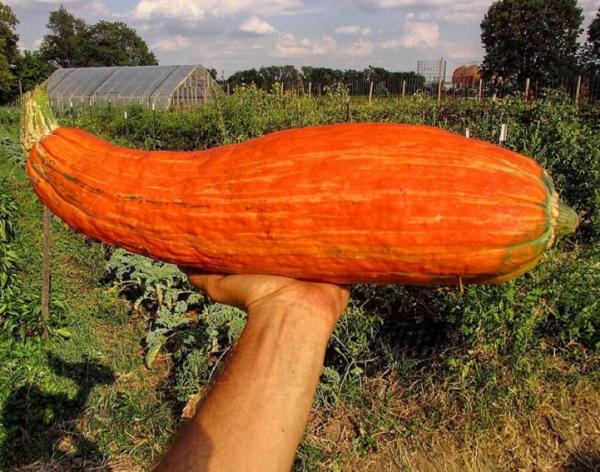There's a viral story that has been making its way around the web about ancient seeds that were found on an archaeological dig. It was said that during a dig on First Nations land in Wisconsin, archeologists found a small clay pot with seeds inside of it that dated back 800 years. The seeds were then given to students at the Canadian Mennonite University in Winnipeg, who had apparently planted and successfully "resurrected" the ancient squash (known as the Gete-Okosomin), which grew to be over 30 pounds in size.
While a story like this is certainly fascinating and actually mimics a similar story of ancient preservation - it is not exactly the truth of what really occurred. According to Kenton Lobe, an environmental studies professor at the University of Winnipeg, "there was no clay ball". The professor recently stated that the actual story was slightly less glamorous - yet at the same time - a story that gives hope.
 The picture of this clay pot was not part of the actual story: “We have no idea where the idea of the clay ball comes from.”
He stated that the seeds were actually a gift - not an archaeological dig discovery - given from elderly gardeners on the Miami Nation of Indiana. These seeds had been preserved through hand-pollination to maintain their purity for over 5,000 years.
“Instead of being neglected for 800 years, it was grown for thousands of years by the Miami. They stewarded the seed year after year, protecting it from cross-pollination and modification”, stated Zachary Paige, who works with White Earth Seed Library, who is also helping to preserve these seeds.
The picture of this clay pot was not part of the actual story: “We have no idea where the idea of the clay ball comes from.”
He stated that the seeds were actually a gift - not an archaeological dig discovery - given from elderly gardeners on the Miami Nation of Indiana. These seeds had been preserved through hand-pollination to maintain their purity for over 5,000 years.
“Instead of being neglected for 800 years, it was grown for thousands of years by the Miami. They stewarded the seed year after year, protecting it from cross-pollination and modification”, stated Zachary Paige, who works with White Earth Seed Library, who is also helping to preserve these seeds.
 Kenton Lobe and Caroline Chartrand at Mennonite University Farm showing off the Gete-Okosomin squash that is grown there. (media.cmu.ca)
It is inspiring to know that there are still people out there who recognize the importance of protecting seeds. We live in a time where large agribusinesses, such as Monsanto, are aggressively destroying the purity of seeds by genetically modifying, patenting, and planting their seeds across vast areas of land. This has ultimately given them the power to shut down local farms where patented seeds have been discovered - even when the planting of these seeds was unintentional.
Kenton Lobe and Caroline Chartrand at Mennonite University Farm showing off the Gete-Okosomin squash that is grown there. (media.cmu.ca)
It is inspiring to know that there are still people out there who recognize the importance of protecting seeds. We live in a time where large agribusinesses, such as Monsanto, are aggressively destroying the purity of seeds by genetically modifying, patenting, and planting their seeds across vast areas of land. This has ultimately given them the power to shut down local farms where patented seeds have been discovered - even when the planting of these seeds was unintentional.
 The picture of this clay pot was not part of the actual story: “We have no idea where the idea of the clay ball comes from.”
The picture of this clay pot was not part of the actual story: “We have no idea where the idea of the clay ball comes from.”“Instead of being neglected for 800 years, it was grown for thousands of years."“We are talking about significant agricultural knowledge,” Lobe said. “The Miami maintained a variety of squash that is prolific; it is huge, and it tastes incredible. Anytime you have something like this; it gives you a glimpse into what people ate and the agricultural knowledge they had.”
 Kenton Lobe and Caroline Chartrand at Mennonite University Farm showing off the Gete-Okosomin squash that is grown there. (media.cmu.ca)
Kenton Lobe and Caroline Chartrand at Mennonite University Farm showing off the Gete-Okosomin squash that is grown there. (media.cmu.ca)"Who controls the food supply controls the people." - Henry KissingerSo although the captivating story of lost-and-found 800-year-old seeds is not the exact truth, we can celebrate the fact that nature can be preserved, and has been for over thousands of years by indigenous human beings who have lived in harmony with the earth. In the end, I believe this story helps us to realize the importance of caring for what we have now - as not caring will inevitably result in its absence. As Lobe states: “There’s something that resonates culturally when we share a heritage seed that has been reclaimed.” Sources: http://www.ancient-origins.net/news-science-space/native-americans-revive-squash-seeds-found-800-year-old-pot-004515 http://indiancountrytodaymedianetwork.com/2015/12/03/shocking-true-story-giant-squash-162639 http://articles.mercola.com/sites/articles/archive/2009/03/07/monsantos-many-attempts-to-destroy-all-seeds-but-their-own.aspx






